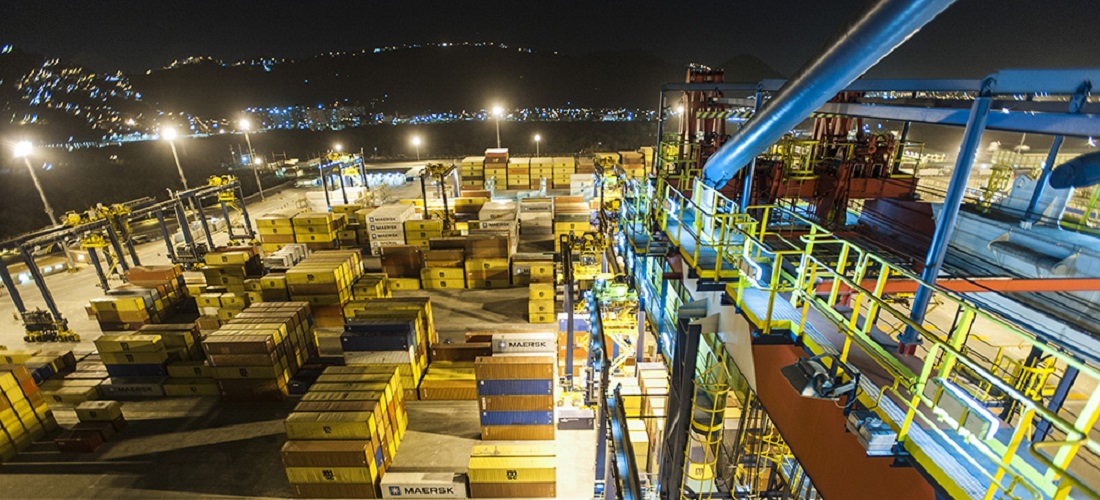
Brazil’s 1st private wireless network to speed up shipments
Oct, 27, 2022 Posted by Gabriel MalheirosWeek 202243
BTP hired TIM and Nokia to install Latin America’s first private industrial wireless network. BTP owns one of the biggest container terminals in the Port of Santos, with a 2 million throughput per year. The company is a joint venture between APM Terminals and Terminal Investment Limited (TIL), two leaders in the global container market, owned by Maersk and MSC, respectively.
The B2B market is the main bet of operators and manufacturers to monetize 5G mobile networks, a widely debated topic at Futurecom. Alberto Griselli, CEO of TIM Brasil, highlights the lower latency of 5G for applications such as smart cameras, which will be installed in the terminal to monitor, in real-time, the movement of containers. The objective is to manage productivity from a monitoring center.
“Low latency combined with high speed and capacity will increase BTP’s productivity and logistics efficiency. We will use an exclusive network on TIM’s 3.5 GHz frequency with a specific core for BTP. In addition, we are strengthening the 4G network in the surroundings to provide better wireless coverage to all workers at the terminal,” explains Griselli.
BTP’s new wireless network will cover an area of 470,000 m² and will consist of eight 5G cells replacing 60 hot spots in a Wi-Fi network. The idea is to have it work redundantly to ensure high availability and resilience, as explained by Marcelo Entreconti, Nokia Enterprise director for Latin America.
According to BTP President Ricardo Arten, the 5G network will connect to electric equipment that will gain sensors that will allow them to be remotely controlled. Consequently, this will increase worker security, reducing foot traffic around the port.
Arten says that each truck that moves through BTP’s terminal is equipped with a tablet, but that signal weakens as they move from one Wi-Fi hotspot to another, which may affect operational effectiveness regardless of how short the time may be. “That problem will be eliminated with 5G. Transactions will go from 50 to 3 milliseconds. Today, most of our communications occur via radio, which will shift to IP. We are looking into developing startups and creating apps to measure dynamic pricing and seek synergies with other vertical companies such as railways and agribusiness. We expect to start operations with the new wireless network in March 2023,” announces Arten.
The project is part of the BRL 3 billion investment plan that the company committed to in exchange for the early renewal of its concession, which expires in 2027 and will be extended for another 20 years. “We want to increase operational capacity within the current limits of our terminal, which no longer can be expanded. Therefore, technology is a key part of the plan: we cannot increase capacity without increasing efficiency,” argues the president of BTP.
He also explained that implementing a 5G network is merely a part of the investment plan, which includes berth reinforcements, pier extension, a 40% increase in the availability of port equipment, and environmental adjustments to make the terminal carbon-free from 2032 onwards.
“This private 5G network will increase the speed at which we can access information—every second matters in our business. A non-operating ship costs USD 60 thousand to its owner. Vessels were not made to stand idly by; they have to go out and connect countries. So the faster the operation, the more efficient we are for our shipowner customers,” says Arten.
Nokia has a focus on refining, mining, manufacturing, ports, and energy markets, with more than 1,500 mission-critical networks and around 500 private 4G and 5G networks deployed worldwide. For Entreconti, technology is just a facilitator, as customers still have to develop use cases. “5G is a fifth-generation technology for us, but for BTP, it represents a pioneering step. In addition to increasing safety and reducing idle time for vessels, the project will reduce energy consumption,” says the Nokia director.
TIM has already chosen the agribusiness and logistics sectors, and soon, other projects will be announced to monetize 5G with connectivity and the creation of an innovation ecosystem. Griselli says there is a lot of interest in the market. “Each industry initially requires coverage, then we develop use cases and monetize the network by combining these two elements. The project with BTP can evolve to co-innovation and co-development of solutions, ” the CEO of TIM.
Source: Valor Econômico
To read the full original article, please go to: https://valor.globo.com/publicacoes/suplementos/noticia/2022/10/25/primeira-rede-privada-para-portos-vai-agilizar-embarques.ghtml
-
Apr, 13, 2022
0
Gen2 Energy partner with Sirius Design & Integration to develop world’s first carrier for hydrogen
-
Ports and Terminals
Feb, 03, 2021
0
DP World Santos announces Fábio Siccherino as new CEO
-
Shipping
May, 28, 2020
0
CMA CGM to accept digital signatures for LOIs in Brazil
-
Economy
May, 29, 2019
0
Brazil’s agricultural secretary attends council in Chile

